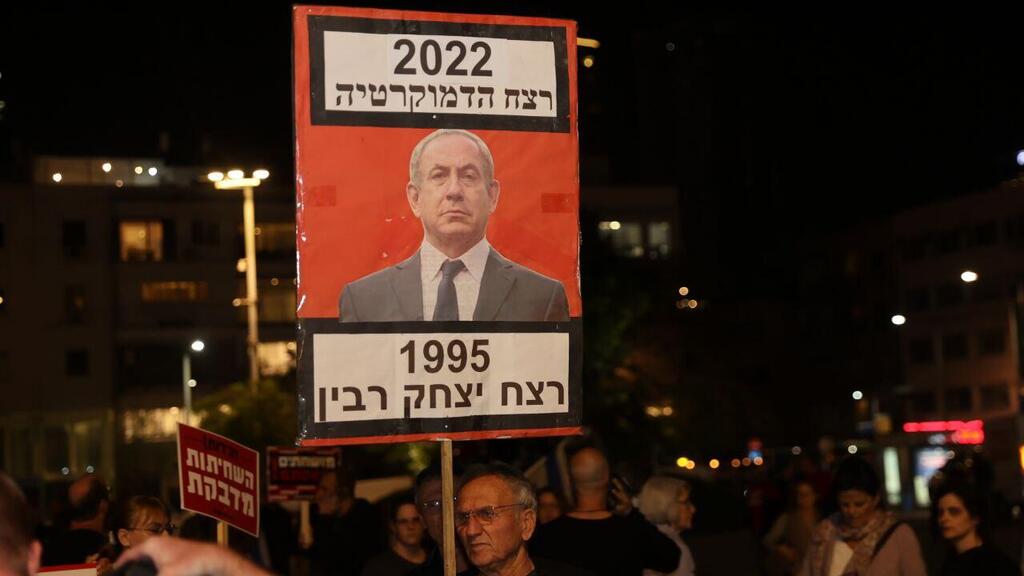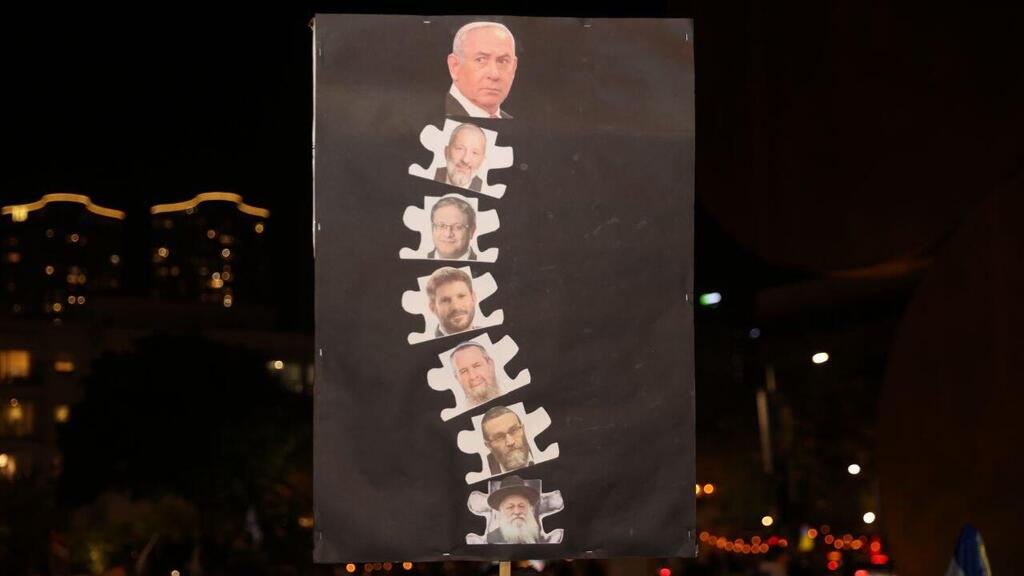In recent years, the Israeli political scene has shifted from realpolitik to revenge politics, a more emotionally charged and ideological system.
This trend has been especially evident in the ultra-Orthodox and religious far-right sector, which has focused on exacting revenge on the former government by adapting "revenge policies," rather than addressing the current crises confronting Israel and its people.
4 View gallery


Anti-Netanyahu campaigners hold up sign during protest against new government
(Photo: Motti Kimchi)
In the last three years, the increasing polarization of the political sphere and the inability of politicians to find common ground have contributed significantly to the said rise of revenge politics.
Each side is focused more on scoring points and settling scores, than finding room for productive dialogue and compromise. This has led to gridlock in the government, with important issues left unresolved and progress hindered. Beside this, we clearly observe an erosion of trust in the political system. When politicians are constantly at each other's throats and unable to work together, it dissolves the faith of the public in the ability of the government to address their concerns - especially economic ones, such as the spiking cost of living.
Israeli politicians must always keep in mind that their primary responsibility is to serve the interests of the people they represent. Revenge politics may be emotionally satisfying in the short term, but it does not solve society's real problems. If we want to address the challenges Israel faces as a nation and find solutions to the most pressing problems, we must abandon revenge immediately!
4 View gallery


Anti-Netanyahu campaigners hold up sign during protest against new government
(Photo: Motti Kimchi)
Nevertheless, identity politics continues to be the growing problem on the Israeli political arena. Issues related to identity, particularly religious ethnicity, have played a greater role in political decisions than they ever should have. This has resulted in a situation in which political parties not only defend and advance the interests of specific groups without considering the overall good of the nation, but also reflect the nation's inability to define itself.
The religious extreme-right, led by Bezalel Smotrich and Itamar Ben-Gvir, continues to define their religion and ethnicity in opposition to those of others. Instead of confronting the complexities surrounding the act of self-definition, they choose to live in opposition; from a certain perspective, this movement continues to exist in Galuth.
Their xenophobia confines them to a perpetual exile for which Israel cannot provide a solution, as they choose not to be free in their own country. By denying the various aspects of Jewish identity, they oppose the fundamental concept of Israel, which is the reunion of all 12 tribes.
4 View gallery


Itamar Ben-Gvir in 2010 detained by police after shouting slogans at White House Chief of Staff Rahm Emanuel during his visit to Jerusalem
(Photo: AP)
The newly-elected government, meanwhile, has been acting with a level of abrasiveness that has been particularly shocking. The most extreme coalition ever elected in Israel has focused solely on attacking the policies of the previous government and advancing its own agenda (rather than addressing the nation's most pressing problems).
The most flagrant example of this is the controversy is the so-called "Aryeh Deri Law," which allows convicted individuals to serve as ministers. This law, which was passed recently, has not only been criticized as a blatant example of an attack against Israeli institution, but a demonstration of the new government's disregard for public's needs.
Israeli civil society must fight for its own rights now more than ever before. It is our collective duty to fight for our nation and against the politicians who brought us to this point. It is essential for civil society to empower themselves and hold their political representatives accountable once and for all. This would require not only becoming more politically active, but also flipping over some tables to pressure them to address our concerns.
Not their own problems, nor those of their friends. Ours! The problems of the nation as a whole. From all across the political spectrum, we must resist and implement a new political system that will allow us to hold all selfish politicians accountable.
Our slumber lasted far too long, and we all failed as a nation to allow this situation to develop, while we remained silent. It is now the time for us to awaken and finally decide our collective fate.


